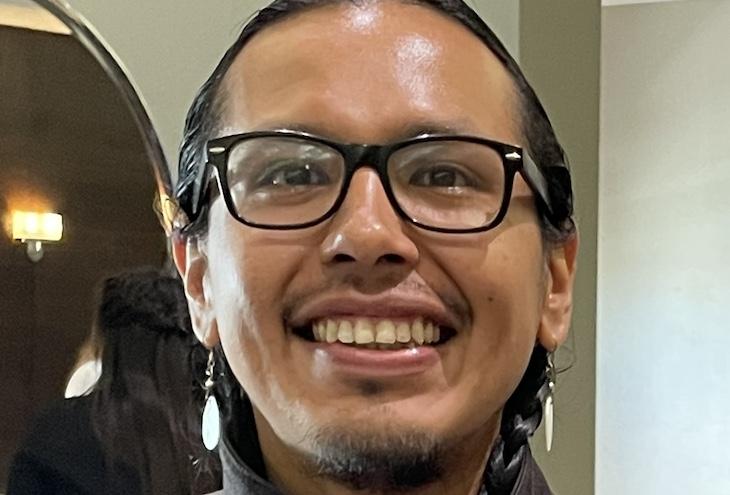I grew up in the small community of Briggs, Okla., east of Tahlequah near the Illinois River. The area is part of my family’s original allotments from the Dawes Allotment Act. My town has two of the three federally recognized Cherokees: my tribe, the United Keetoowah Band of Cherokee Indians in Oklahoma, and the Cherokee Nation of Oklahoma. Tahlequah also has Sequoyah High School and Northeastern State University, which both began as boarding schools for the area. Sequoyah High School is now a private Indian school run by the Cherokee Nation of Oklahoma, while NSU is a public university with one of the boarding school’s original seminary buildings now serving as classrooms.
I returned home when the pandemic started to help my tribe in any way I could. Once my tribe was more situated, I decided to go back to school to pursue my master’s in American Indian Leadership. I joined AISES in the spring semester of 2023 because the chapter was going through a rebuilding phase.
My passion is serving my community and facilitating conversations that make space for diverse perspectives. When I returned to my tribe between college and graduate school, I needed to be with the people, first to help the elders and then the youth.
I hope to continue mentoring community members, whether in higher education, in my tribal community, or while traveling. My master’s research focuses on creating and promoting “sacred zones,” which are Indigenized safe spaces that highlight diverse perspectives.
My main goal in my research and future career is to help build a better educational model that allows diverse perspectives to be taken seriously in the academic arena. I want to inspire a generation of thinkers rather than repeaters and create a space in sacred zones where people always feel safe asking for help.
I was inspired to pursue this goal because my dad told me that “you can’t save the world by yourself,” so these sacred zones would create more spaces where critical conversations could take place, ultimately helping our communities. If my work is successful, I’ll put myself out of a job — we won’t need social workers or climate and water protectors.
In my culture, if you are picked to lead, you must accept. There’s no word for “please” or “you’re welcome” in my language because giving help is expected, and whenever duty calls, you have a responsibility to step up.
I have been supported by family throughout my education journey. My parents never had any higher education, so their advice was to try my best to figure things out since I was the first to go that far. My younger sister also chose to attend college and was able to graduate before I did, which further encouraged me to complete my bachelor’s degree.
My college experience was part of what prompted me to start this “sacred zones” project since my sister and I both craved a safe, Indigenized space when we were undergrads. Dr. Dan Wildcat is one of the many mentors who have helped me find a path that felt natural, where I could channel my energy effectively. I was later asked by my friend Gable Roubideaux to help out with the Indigenous Justice Initiative because one of the cases focused on the Mvskoke people (Royal v. Murphy – McGirt), so I was able to assist in this project.
This tribunal awakened an energy inside me and gave me space to be heard, especially since I want my work to benefit others. Dr. Wildcat then took me to a conference called Rising Voices held at the National Center for Atmospheric Research, which facilitates opportunities for Indigenous and non-Indigenous scientific experts and community leaders to address the effects of extreme weather and climate events on communities. This was my first conference, but support from my community gave me the courage to give my first speech to a large audience. We also held the Indigenous Environmental Network and It Takes Roots “A Just Transition” conference at the Haskell Indian Nations University.
I dream that someday my goal for our communities will be considered conservative, not radical, and that this is just the beginning for sacred zones where Indigenous people can share their thoughts, without judgment, and plan for a more just future.
— As told to Alexandra Leiseca












